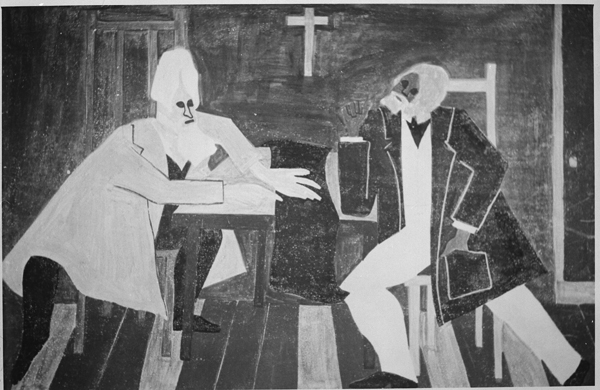Venus & Jupiter: The Conjunction of Brown & Powell

Frederick Douglass argued against John Brown’s plan to attack the arsenal at Harpers Ferry, Jacob Lawrence
One hundred and fifty years ago, a man named John Brown was put to death by the state. He was not gunned down in the street, nor was he unarmed. He was arrested by Robert E. Lee for leading a raid on the national armory at Harpers Ferry, Virginia. He had planned to arm America’s slaves with a hundred thousand guns. He was a white man, a preacher. Newspapers called him “a madman.” In most pictures he had “crazy eyes.” Abe Lincoln declared him “insane.” One thing’s for sure, he was mad. His rage boiled over.
American poets compared Brown’s life to a meteor that tore across the sky as he sat in jail, very nearly bisecting the interim of his conviction and execution. Emerson called him a saint, “whose martyrdom, if it shall be perfected, will make the gallows as glorious as the cross.” Thoreau said, “When a man stands up serenely against the condemnation and vengeance of mankind, rising above them by a whole body . . . the spectacle is a sublime one.” Both had attended his speeches and probably knew about the raid before it happened. Years later, Melville wrote, “the streaming beard is shown / (Weird John Brown), / The meteor of the war.” Whitman, who was there, put him in Leaves of Grass: “YEAR of meteors! brooding year! / I would sing how an old man, tall, with white hair, mounted the scaffold in Virginia; / (I was at hand—silent I stood, with teeth shut close—I watch’d; / I stood very near you, old man, when cool and indifferent, but trembling with age and your unheal’d wounds, you mounted the scaffold;)” The actor John Wilkes Booth was there, too. He wrote his piece in Lincoln’s blood.
Even Victor Hugo, in exile, called for Brown’s pardon. “There is something more frightening than Cain killing Abel,” he said, “and that is Washington killing Spartacus.” READ MORE >
